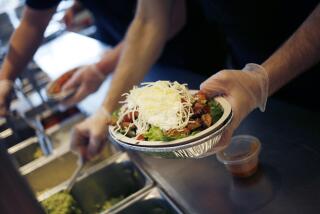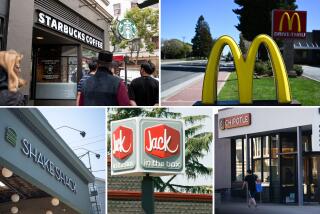Smoking Banned by O.C.-Based Taco Bell Chain
- Share via
IRVINE — Taco Bell Corp. said Monday that it will ban smoking at its company-owned restaurants and that most of its franchisees are expected to follow suit, giving the Mexican-style fast-food chain the largest number of smoke-free outlets in the nation.
The Irvine-based company said it will snuff out cigarettes, cigars and pipes at its 3,300 company locations nationwide on March 28 and that at least 1,000 additional sites owned by franchisees will also ban smoking.
Taco Bell’s action follows similar steps taken by other fast-food chains, including No. 1 McDonald’s Inc., as the effects of second-hand smoke--especially on children--are being scrutinized more closely at local and federal levels.
U.S. Surgeon Gen. Joycelyn Elders on Monday praised Taco Bell, McDonald’s and other smoke-free chains that cater to youths. “I’m very grateful that many of our fast-food restaurants are taking this stand for our children, who cannot decide their own environment,” she said.
U.S. Rep. Henry Waxman, (D-Los Angeles), who is sponsoring federal legislation to ban smoking in public places, said that Taco Bell’s decision “shows a real sense of corporate responsibility for the health of customers, especially children, who should not to be forced to breathe in someone else’s smoke.”
Taco Bell’s action follows a trend that has been growing for some time.
Four years ago, the California Restaurant Assn. called for legislation to ban smoking in all restaurants. Two years ago, the Carl’s Jr. and Chuck E. Cheese chains banned smoking in company-owned eateries. And Arby’s and Dairy Queen announced plans earlier this year to eliminate smoking at company-owned units.
McDonald’s Corp., bowing to pressure from consumer groups, said three weeks ago that it would ban smoking at 1,400 company outlets. About 2,200 franchise units were already smoke-free, bringing the company’s total nonsmoking units to 3,600 of its 9,100 restaurants nationwide. No other franchisees have yet adopted the company’s policy, a spokeswoman said Monday.
Taco Bell’s decision, therefore, affects more sites immediately. The company-owned locations consist of 3,100 full-service eateries and 200 limited-menu outlets called Taco Bell Express. All but 400 of the company’s 1,400 franchise restaurants have indicated that they will probably adopt a smoking ban, spokeswoman Janis Smith said.
Last month, the Texas attorney general sued Taco Bell, McDonald’s and three other major chains, alleging that they endangered the health of patrons--particularly children--by exposing them to second-hand smoke. It was unclear Monday what effect Taco Bell’s action would have on the suit.
Smith said the company’s decision was not an effort to settle the suit. “This is something we’ve looked at a long time and something our customers want,” she said.
The decision followed a 12-month nationwide customer survey conducted by an independent firm, Smith said. The statistics showed that 70% of Taco Bell customers who smoked and 84% of customers who didn’t favored smoke-free fast-food establishments. In addition, the survey found that 71% of Taco Bell’s customers are nonsmokers.
Industry insiders say that the number of smoke-free restaurants will continue to grow.
“I think smoking bans will have virtually no effect on fast-food restaurants,” said Michael Mueller, a restaurant analyst with Montgomery Securities in San Francisco. “You wait in line, you eat, you go. And the drive-through business will be completely unaffected.”
Full-service restaurants, on the other hand, suffer when smoking is not allowed, Mueller said. “At a restaurant where customers sit at a table for an hour or two, it really detracts from a smoker’s pleasure not to be able to smoke.”
But the tobacco industry doesn’t think that fast-food chains can ignore smokers.
“Taco Bell’s decision potentially alienates up to 30% or more of its customer base,” said Thomas Lauria, a spokesman for the Tobacco Institute, the trade association for the cigarette industry.
“I can’t think of any business that can afford to do that,” he said. “There has been a concentrated effort by anti-smoking groups to pressure chain restaurants to ban smoking. It’s not fair to their customers, who will go to restaurants that welcome smokers.”
Pizza Hut, for instance, is “on the cusp” between fast-food and sit-down family restaurants, spokesman Rob Doughty said. Customers stay in fast-food eateries an average of 15 minutes, but they stay in Pizza Hut an average of 45 minutes, he said. Three studies showed that a no-smoking policy would hurt the company’s business, he said.
Tobacco companies are fighting back. Philip Morris U.S.A., the nation’s biggest cigarette maker, and a small number of restaurant owners are pushing a ballot initiative in California to invalidate ordinances that have been adopted by more than 100 cities, including Los Angeles, to ban smoking in restaurants.
But the weight of official studies is against them.
Last year, the Environmental Protection Agency officially branded secondary tobacco smoke a human carcinogen, concluding that it causes 20% of all lung cancers in the United States not attributed directly to smoking.
The agency’s finding sparked a spate of workplace smoking bans by employers who feared a rash of lawsuits by employees and customers.
Second-hand smoke, for instance, can trigger asthma attacks in children who suffer from that respiratory ailment, said Marian O’Sullivan, a health educator with the American Lung Assn. of Orange County.
O’Sullivan applauded Taco Bell’s decision. “Kids love Taco Bell, so it’s wonderful that the restaurants now will be smoke-free.”
Other fast-food chains are considering smoking bans. Burger King, for instance, is tracking consumer complaints through a toll-free telephone line but hasn’t seen a “clear consensus from customers,” spokesman Michael Evans said.
Kentucky Fried Chicken has been conducting surveys as Taco Bell did and expects to have results within a month, spokeswoman Jean Litterst said. KFC, Pizza Hut and Taco Bell are all owned by Pepsico Inc. in Purchase, N.Y., but set their policies separately.
At Wendy’s International Inc., executives are concerned about related issues. The company isn’t sure it wants to turn its employees into enforcers, and it doesn’t want to get into a fight with franchisees who don’t want to go along with a smoking ban, spokesman Mike Jenkins said.
“As the market gets closer and closer to deciding that a ban is what they want, we’ll obviously start moving” toward that, Jenkins said.
More to Read
Inside the business of entertainment
The Wide Shot brings you news, analysis and insights on everything from streaming wars to production — and what it all means for the future.
You may occasionally receive promotional content from the Los Angeles Times.










